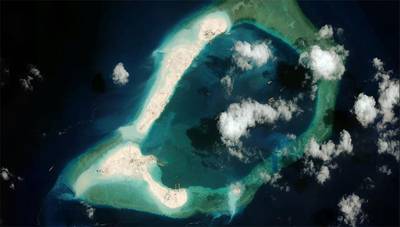The House Armed Services Committee (HASC) invited two U.S. Naval War College (NWC) faculty members to testify in Washington, D.C. on understanding and countering China's growing maritime concerns.
Andrew Erickson, professor of strategy in the China Maritime Studies Institute (CMSI), and James Kraska, professor in the Stockton Center for the Study of International Law, explained to the subcommittee the current situational framework and offered courses of action at the committee's hearing titled "Seapower and Projection Forces in the South China Sea."
Erickson's testimony centered on China's growing involvement of their Maritime Militia, which he describes as the third maritime force in addition to the nation's navy and coast guard.
The Maritime Militia is a civilian force posing as fishing boats and other noncombatants but is clearly under the operational control of the government, according to Erickson.
"China's irregular sea force is one of the most important-yet most under-considered-factors affecting U.S. security interests in the South China Sea," said Erickson in his testimony. "Many in Washington understand that China has the world's second-largest blue water navy, some that China has the world's largest blue water Coast Guard. But almost no one knows that China-drawing on the world's largest fishing fleet-has deployed the world's largest Maritime Militia; and virtually the only one charged with advancing disputed maritime claims."
Kraska's testimony focused on the legal issues of the region and enforcement of the rule of law in the oceans. The events unfolding in the area have regional and global consequences, he said.
"The South China Sea is the maritime fulcrum in East Asia, where the United States has treaty commitments to Japan, Korea, Thailand, Australia, and the Philippines, and legislative obligations to Taiwan," testified Kraska. "The rule of law in the oceans provides an important force multiplier for U.S. military operations and diplomacy. Consequently, the navigation and overflight rules accepted in the region have great strategic consequence."
Kraska also gave the committee direction on how the United States' responses to China's actions in the region could improve the situation in the long term.
"The right to transit through some Asian littoral areas is being effectively abandoned out of concern that China will react and create an incident," he said. "But forgoing the right to be present in these areas makes it more likely that it will be impossible to reenter them later. Indeed, the cost of doing so now is higher than it would have been had the United States continuously exercised its rights; the cost tomorrow will be even greater unless action is taken now. China's expectation and sense of entitlement to 'own' parts of the global commons increases each year they remain unchallenged."
Erickson also gave advice on how to effectively respond to China.
First, Erickson asked for the U.S. to call out China's Maritime Militia officially in public.
Second, Erickson proposed having the U.S. share information with countries at risk, and provide strategic reassurance to them.
Last, he called for the U.S. to communicate clearly with Chinese interlocutors and make it plain that any elements that ignore repeated warnings by U.S. vessels to desist from disruptive activities will be treated as military-controlled and dealt with accordingly, to ensure self-defense and unobstructed mission accomplishment.














